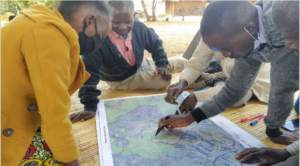Key Accomplishments and Challenges
 During the third quarter of fiscal year (FY) 2020, ILRG operations slowed down and pivoted in the face of global impacts of the coronavirus disease 2019 (COVID-19). ILRG onboarded a new Global Gender Advisor and continued preparing the groundwork for new partnerships/activities, particularly in Mozambique, Madagascar, and Malawi and with the cocoa sector.
During the third quarter of fiscal year (FY) 2020, ILRG operations slowed down and pivoted in the face of global impacts of the coronavirus disease 2019 (COVID-19). ILRG onboarded a new Global Gender Advisor and continued preparing the groundwork for new partnerships/activities, particularly in Mozambique, Madagascar, and Malawi and with the cocoa sector.
Mozambique: At the policy level ILRG advanced a memorandum of understanding (MoU) with the Ministerial Commission for Revision of the Land Law. With a new director in place, ILRG has the opportunity to positively engage on policy work moving forward. A scope of work for field implementation of activities with Novo Madal was finalized, including both agriculture and gender support as well as land delimitation. Agreements with Green Resources management and board were finalized on the process for moving forward with land delimitation work. Portucel engagements are also being finalized with a draft request for proposals under development. Activities related to disaster relief funding on land rights in Sofala Province moved relatively slowly as relationships are being established with the National Institute for Disaster Management and travel to the districts has been restricted for the ILRG team. These will be prioritized in the coming quarter. Funding commitments this quarter and agreements with private sector partners have meant that Mozambique activities should be well placed to advance in the coming months, though COVID-19 impacts threaten to slow this progress.
Zambia: ILRG engaged with the Ministry of Lands and Natural Resources (MLNR) on the virtual validation of the draft Land Policy this quarter, consolidating input from across donors. Agreements with the Department of National Parks and Wildlife and MLNR for continued partnership were advanced this quarter though leadership has evolved in both institutions. ILRG completed the recruitment for a new Country Coordinator to replace Dr. Emmanuel Mutale who passed away in March 2020. ILRG field partners continued with land documentation work, land administration and district planning. ILRG launched new partnerships with Madison Finance Limited (MFinance) on microfinance in Eastern Province and with the Wildlife Producers Association of Zambia (WPAZ). The Zambia National Community Resources Board Association (ZNCRBA) and Frankfurt Zoological Society (FZS) both worked with ILRG to prepare for future work on gender integration and community resources board governance. ILRG’s support for a Prindex sub-national deep dive is being folded into the Zambia portfolio.
Ghana: Ghana field activities planned for this quarter were largely suspended due to COVID-19 related restrictions. The team prepared a remote climate change training program and worked with Ecom Agroindustrial Corp. (ECOM) to develop a concept note for a potential payment for ecosystem services (PES) scheme. The fee-for-service FarmSeal uptake has been extremely low with only 70 farmers out of 842 mapped farms (766 farmers availed themselves of the service) agreeing to pay for the initial fee-for-service program. With respect to farm rehabilitation models, data has demonstrated that cash crop returns to date do not demonstrate a business case for the farm rehabilitation service, as currently designed. This will be updated in the next season.
India: COVID-19 restrictions prevented the ILRG India team from visiting target communities this quarter; the team remained in touch with partners and community representatives by phone. Several planned activities, such as the training module on potato agronomy record keeping, gender-based violence (GBV) training for PepsiCo field staff, Project-level Women’s Empowerment in Agriculture Index (PRO WEAI)/Prindex baseline data collection, the roll-out of mini-study findings, and Empowered Entrepreneurship training for women’s group members and PepsiCo farmers families could not be completed due to the COVID-19 lockdown. Instead, work focused on activities that could be completed while the team worked from home, including a land policy study and land leasing group report, work plan development, collection of yield data from participants in potato agronomy training, and adaptation of training materials related to norms change, Empowered Entrepreneurship, and GBV to the local context.
W-GDP: In Zambia, ILRG launched the customary gender guidelines processes, and at the field level negotiated gender integration opportunities with wildlife and natural resource management partners. W-GDP integration in Mozambique focused on preparations of requests for proposals related to new multi-year partnerships. In India, W-GDP work related to taking stock of the first growing season impacts and preparation of the next country work plan. In Malawi, ILRG received approval from both USAID and the Malawian government to advance documentation work. Activities with the cocoa sector involved the development of a concept note with ECOM and emerging partnership commitments from two major chocolate brands.
Other Activities: ILRG launched a new set of completion activities around responsible mineral trade with a subcontract to support the Public-Private Alliance for Responsible Minerals Trade (PPA) and is preparing additional partnerships around mapping of conflicts in the Democratic Republic of Congo (DRC). ILRG advanced partnerships in Madagascar with Helvetas related to a private sector co-financed activity in the Sambirano Valley. This activity is expected to go through a two-year assessment/activity development phase. ILRG continued advancements with USAID on guidance for USAID’s Policy on Promoting the Rights of Indigenous Peoples, completing drafts on regional and technical themes. ILRG’s two grants to carry out community land protection activities in Liberia were on hold this quarter due to COVID-19.

